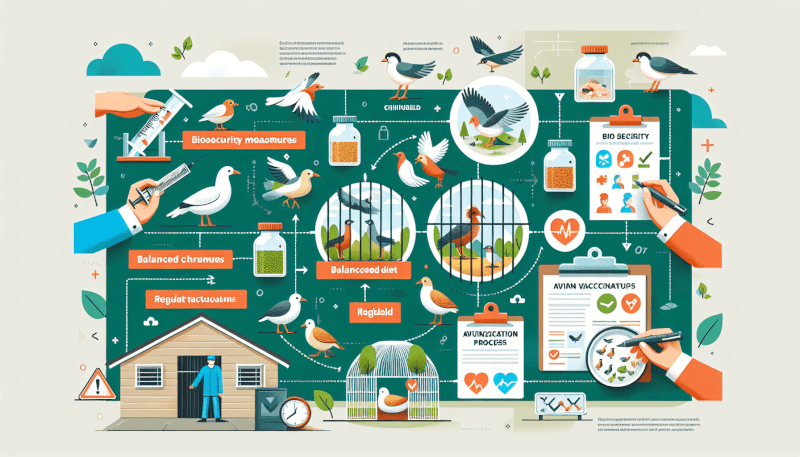Birds are fascinating creatures that bring joy to our lives with their beautiful songs and vibrant colors. However, it is important to be aware that birds can also be susceptible to various diseases. In this article, you will discover top tips that will help you prevent avian diseases and ensure the health and well-being of your feathered friends. From maintaining a clean and hygienic environment to providing a balanced diet, these simple yet effective measures will ensure that your birds stay happy and healthy. So, let’s dive in and explore the essential guidelines for keeping avian diseases at bay.
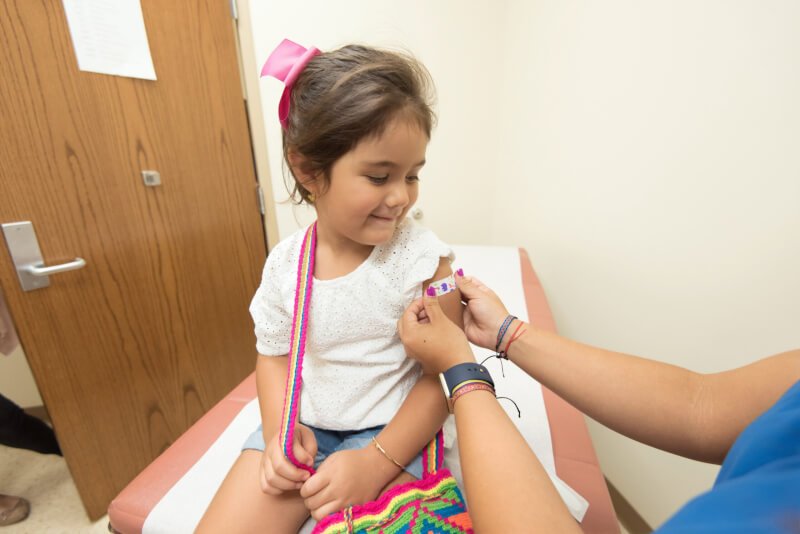
Biosecurity Measures
Quarantine new birds
Quarantine is an essential biosecurity measure to prevent the introduction and spread of avian diseases. When introducing new birds to your flock, it is crucial to isolate them in a separate area for a specific period. Quarantine allows you to closely monitor the health of the new birds without risking the health of your existing flock. During quarantine, observe the new birds for any signs of illness such as lethargy, respiratory distress, or abnormal behavior. It is advisable to consult a veterinarian to establish the duration of quarantine based on the specific avian diseases you want to prevent.
Isolate sick birds
Isolating sick birds is crucial to prevent the spread of diseases within your flock. If you observe any signs of illness, such as decreased appetite, coughing, or nasal discharge, separate the affected birds from the healthy ones immediately. Isolation helps minimize direct contact between sick and healthy birds, reducing the risk of disease transmission. Provide appropriate veterinary care and closely monitor the sick birds until they recover fully or until you can determine the cause of their illness.
Control visitor access
Controlling visitor access to your premises is an important biosecurity measure. Limiting the number of people who come into contact with your birds reduces the chances of introducing or spreading diseases. Install signs at the entrance of your property, providing instructions for visitors to follow, such as handwashing, shoe disinfection, and wearing protective clothing. Visitors should be aware of the potential risks they pose to your flock and comply with your biosecurity measures.
Practice good hygiene
Maintaining good hygiene practices is crucial to prevent the spread of avian diseases. Clean and disinfect your footwear, clothing, and equipment before entering or leaving the area where your birds are housed. Regularly wash your hands thoroughly with soap and water, especially after handling sick or deceased birds. Use disinfectants recommended by veterinarians to clean the surroundings and equipment used in the bird area. By practicing good hygiene, you minimize the risk of transferring pathogens from one area to another.
Clean and disinfect equipment
Regularly cleaning and disinfecting equipment used for feeding, watering, and housing your birds is essential for preventing diseases. Bacteria, viruses, and other pathogens may contaminate equipment, leading to the spread of diseases within your flock. Clean equipment with soap and water first, ensuring you remove all visible dirt and feces. Afterward, use an appropriate disinfectant to thoroughly sanitize the equipment, following the manufacturer’s instructions. Regular cleaning and disinfection of equipment help maintain a healthy environment for your birds and reduce the risk of disease transmission.
Vaccination
Consult a veterinarian
Consulting a veterinarian is crucial when it comes to vaccination for avian diseases. A veterinarian will assess your flock’s specific needs and recommend a suitable vaccination schedule and type of vaccines to administer. They have the knowledge and expertise to understand the prevalence of diseases in your area and can advise on the most effective preventive measures. Additionally, veterinarians can provide valuable guidance on proper storage and administration of vaccines, ensuring their effectiveness.
Follow recommended vaccination schedule
Following a recommended vaccination schedule is vital to protect your birds from diseases. Vaccines serve as an essential preventive measure to build immunity against specific pathogens. Work closely with your veterinarian to establish a vaccination plan that meets the needs of your flock. Vaccines should be administered at the recommended age and frequency to ensure optimal protection. Keep detailed vaccination records to track and manage your flock’s immunization history effectively.
Keep vaccination records
Maintaining accurate vaccination records is essential for effective disease prevention and control. Keep a record of the vaccines administered, batch numbers, vaccination dates, and the birds that received them. Vaccination records help you track the immunization status of each bird, identify any gaps in coverage, and assist your veterinarian in developing a comprehensive health management plan. These records also provide crucial information in case of disease outbreaks, helping authorities and veterinarians assess the situation and implement control measures.
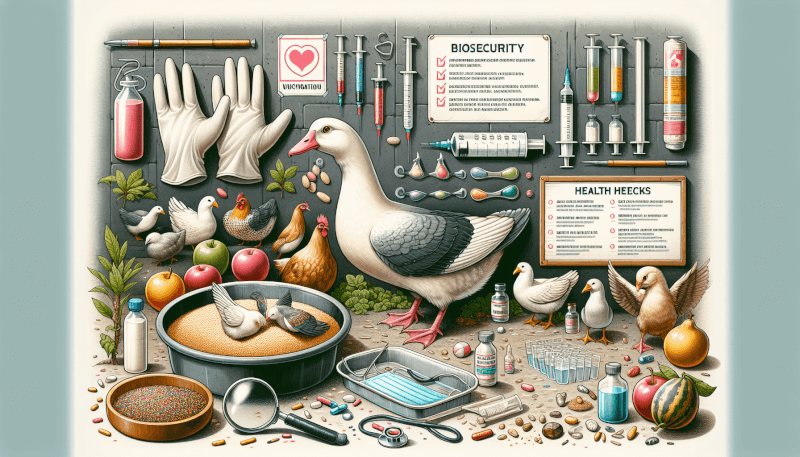
Proper Nutrition
Provide a balanced diet
Proper nutrition plays a significant role in the overall health and disease resistance of your birds. Provide a well-balanced diet that meets the specific nutritional requirements of your flock. A balanced diet includes a combination of grains, proteins, vitamins, and minerals. Depending on the species and age of your birds, consult with a poultry nutritionist or veterinarian to develop a suitable diet plan. Ensure that the feed you provide is of good quality and free from contaminants that could compromise the health of your birds.
Ensure proper feed storage
Proper feed storage is crucial in maintaining its quality and preventing contamination. Store feed in a clean and dry area, away from direct sunlight and pests. Use appropriate containers that are rodent-proof and tightly sealed to prevent infestations and moisture from compromising the feed. Regularly inspect and discard any feed that shows signs of mold, spoilage, or pest infestation. Proper feed storage practices help ensure that your birds receive the best nutrition while minimizing the risk of disease transmission through contaminated feed.
Avoid contaminated water
Water quality is essential for the health and well-being of your birds. Ensure that the water you provide is clean and free from contaminants. Regularly clean and disinfect water containers to prevent the build-up of algae, bacteria, and other harmful microorganisms. Monitor the water source for any potential contamination, such as runoff from chemicals or waste. Provide fresh and clean water daily, and promptly address any issues or changes in water quality that may negatively impact your birds’ health.
Housing and Environment
Provide adequate housing space
Providing adequate housing space is critical to ensure your birds’ well-being and minimize the risk of disease transmission. Overcrowding can create stress and increase the chances of disease outbreaks within your flock. Follow industry guidelines and provide sufficient space for each bird to move, feed, and roost comfortably. Consider factors such as the size and type of birds, ventilation requirements, and the potential for future flock growth. Proper housing space promotes better air circulation, reduces humidity levels, and allows for proper waste management.
Maintain proper ventilation
Maintaining proper ventilation in the bird housing environment is essential for preventing disease outbreaks. Good air circulation helps remove excess moisture, ammonia, dust, and other harmful substances from the air. Proper ventilation helps prevent the buildup of pathogens, reduces the risk of respiratory diseases, and promotes overall bird health. Ensure that your bird housing facility is designed with adequate air vents, fans, or exhaust systems. Regularly clean and maintain these ventilation systems to ensure optimal functionality.
Prevent overcrowding
Overcrowding in bird housing facilities can lead to stress, increased competition for resources, and the spread of diseases. Avoid overcrowding by adhering to recommended stocking densities based on the type and age of your birds. Overcrowded conditions limit birds’ movements, increase stress levels, and make it easier for diseases to spread. Regularly assess the space requirements of your flock and make appropriate adjustments to ensure a healthy and comfortable living environment for your birds.
Keep the environment clean
Maintaining a clean environment is vital for preventing the buildup and spread of pathogens. Regularly clean and disinfect the bird housing area, including walls, floors, perches, and nesting areas. Remove any accumulated waste, such as feces or uneaten feed, promptly. Designate specific areas for waste storage and ensure proper disposal. Regularly inspect the housing environment to identify and address any potential sources of contamination. A clean environment promotes bird health, reduces stress, and minimizes the risk of disease outbreaks.
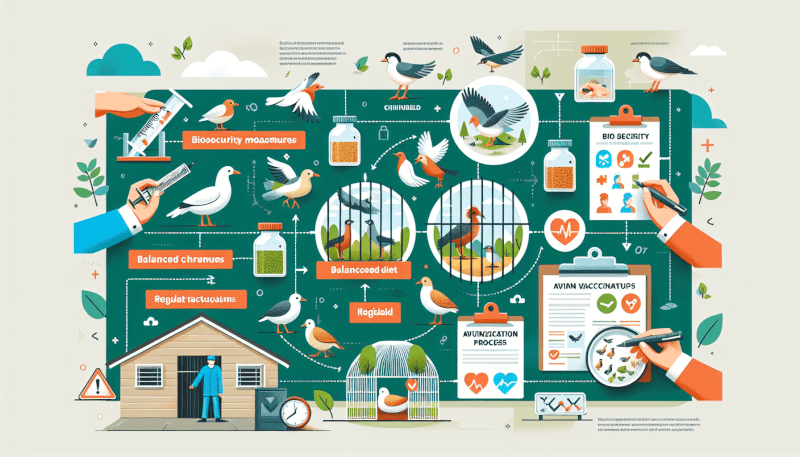
Pest Control
Implement rodent control measures
Rodents can pose a significant threat to the health of your birds and the biosecurity of your farm. Implementing effective rodent control measures is essential. Regularly inspect your bird housing area and perimeter for any signs of rodent activity. Seal any entry points and use traps or baits to eliminate rodents. Keep feed and other supplies properly stored in rodent-proof containers. Rodents can carry and transmit diseases to your birds, so it is essential to remain vigilant and proactive in your pest control efforts.
Keep wild birds away
Wild birds can carry and transmit avian diseases to your flock. Preventing their access to your bird housing area is crucial for disease prevention. Install bird netting or wire mesh around the housing area to create a physical barrier against wild birds. Monitor for any bird droppings or nests, and promptly remove them to minimize disease transmission risks. Maintaining a bird-free environment significantly reduces the chances of disease introduction and improves the overall biosecurity on your farm.
Use insect repellents
Insects can be carriers of various diseases, and controlling them is essential for biosecurity. Use insect repellents or insecticides approved for poultry use to prevent the infestation of pests. Regularly inspect your bird housing area for signs of insect activity, such as flies, mosquitoes, or mites. Implement appropriate measures to eliminate or control them, such as insecticidal sprays or positioning sticky traps. Effective pest control reduces the risk of disease transmission and ensures the well-being of your birds.
Monitoring and Disease Surveillance
Regularly observe bird behavior
Regularly observing the behavior of your birds is a vital aspect of disease surveillance. Monitor their eating habits, activity levels, and social interactions. Any significant changes in behavior, such as sudden weight loss, decreased appetite, or increased aggression, may indicate underlying health issues. Early detection of abnormal behavior allows you to promptly investigate and address potential diseases, preventing further spread within your flock.
Monitor for signs of illness
Closely monitor your birds for any signs of illness to ensure early detection and timely intervention. Be vigilant for symptoms such as sneezing, coughing, abnormal discharge, changes in appearance, or unusual vocalizations. Check for any changes in egg production, hatchability, or abnormal growth rates in young birds. Regular health checks and inspections help identify potential disease outbreaks and allow you to take appropriate measures for treatment and prevention.
Report any unusual findings
Promptly report any unusual findings or signs of illnesses to your veterinarian or relevant authorities. Early reporting is crucial for timely disease identification, control, and prevention within your area. Cooperation and communication with veterinary authorities help in monitoring disease trends and implementing appropriate control measures. Report any concerning symptoms, unexplained mortality, or unusual behavior to ensure the health and safety of your birds and the wider poultry community.
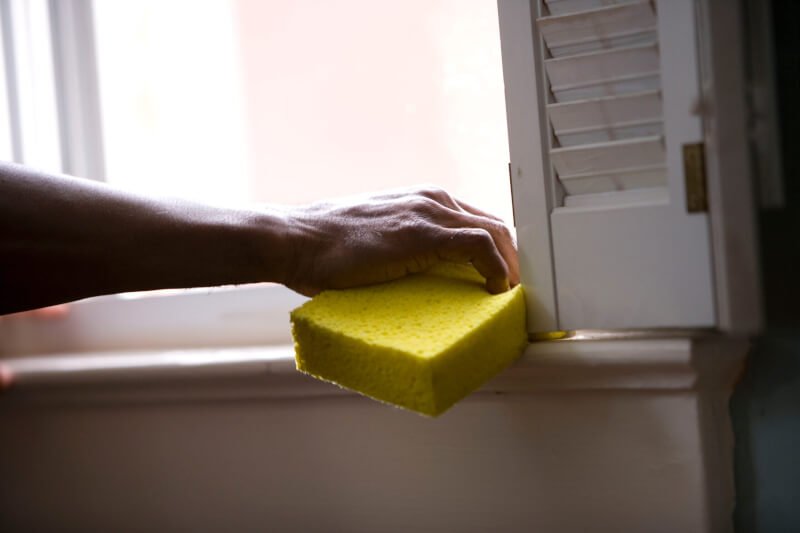
Training and Education
Educate staff and caregivers
Providing proper training and education to your staff and caregivers is essential for effective disease prevention. Educate them about biosecurity measures, such as hand hygiene, protective clothing, and proper animal handling techniques. Ensure they understand the signs of a healthy bird versus an unhealthy one and how to report any concerns. Regular training sessions and workshops help keep your team updated on the latest industry guidelines and best practices, enhancing their ability to contribute to disease prevention efforts.
Train in proper handling techniques
Proper handling techniques are crucial to minimize stress and reduce the risk of disease transmission during bird management activities. Train your staff and caregivers in gentle and appropriate handling methods, including how to catch, examine, and administer treatments to birds. Emphasize the importance of equipment hygiene and cleanliness during handling procedures. Effective training in handling techniques ensures the safety and welfare of your birds while minimizing the potential for disease introduction or spreading.
Stay updated with industry guidelines
Staying updated with industry guidelines and best practices is critical for effective disease prevention. Regularly review and follow the recommendations provided by veterinary authorities, industry experts, and poultry organizations. Participate in workshops, conferences, and webinars to expand your knowledge and network with professionals in the field. By maintaining updated information and implementing recommended practices, you can enhance your biosecurity measures and reduce the risk of avian diseases in your flock.
Quarantine and Biocontainment
Separate new birds from existing flock
When introducing new birds to your existing flock, it is crucial to implement quarantine measures. Separate the new birds from the existing flock for a specific duration to monitor their health and ensure they are free from diseases. Quarantine reduces the risk of introducing potential pathogens to your entire flock and allows you to address any health concerns before integration. Consult with your veterinarian to establish an appropriate quarantine period and ensure that the new birds receive proper care and observation during this time.
Implement biocontainment protocols
Biocontainment protocols are essential for preventing the spread of diseases within your flock and beyond your farm. Establish zones or areas with different biosecurity levels, such as restricted access or controlled entry points. Implement strict measures to control the movement of personnel, vehicles, and equipment between these areas. Use physical barriers and signage to clearly delineate boundaries and enforce biosecurity measures. By implementing robust biocontainment protocols, you can limit the transmission of diseases and maintain the health of your flock.
Prevent transmission of diseases
Preventing the transmission of diseases is a primary goal of effective biosecurity measures. Minimize direct contact between birds from different sources, including wild birds, neighboring flocks, or birds exhibited at shows or markets. Enforce strict biosecurity measures when interacting with other poultry owners or visitors to your farm. Implement a clear disease control plan that includes vaccination schedules, regular health checks, and isolation of sick birds. By preventing disease transmission, you can protect the health and well-being of your birds, as well as those in the wider poultry community.
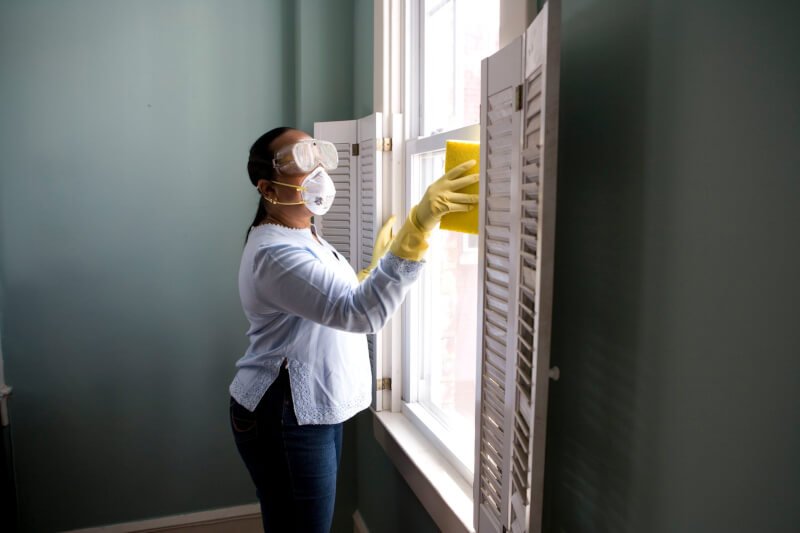
Health Monitoring and Testing
Regular health checks
Regular health checks are essential for maintaining the well-being of your flock. Schedule regular visits from a veterinarian to conduct thorough examinations and assess the overall health of your birds. During health checks, veterinarians can observe physical appearance, body condition, respiratory function, and other key indicators of health. Utilize their expertise to identify and address any potential health issues before they develop into major problems. Regular health checks contribute to early disease detection and effective disease prevention strategies.
Diagnostic testing
Diagnostic testing plays a crucial role in disease prevention and control. Work with your veterinarian to establish a testing plan that aligns with the specific diseases prevalent in your area. Diagnostic tests can include blood tests, fecal examinations, or swabs from the respiratory tract. These tests help identify the presence of pathogens, assess disease risks, and guide appropriate control measures. Regular and targeted diagnostic testing allows for proactive disease management and can significantly reduce the impact of diseases on your flock’s health and productivity.
Promptly address any health issues
Promptly addressing any health issues is vital for effective disease prevention and control. Be attentive to any changes in behavior, appearance, or performance of your birds. If you observe any signs of illness or abnormality, seek veterinary advice immediately. Delaying appropriate treatment can lead to the rapid spread of diseases, resulting in significant losses. Timely intervention and response to health issues help reduce the severity and duration of diseases and contribute to the overall well-being of your flock.
Collaboration and Communication
Work with local authorities
Collaborating with local authorities is crucial for disease prevention and control. Establish relationships with veterinary authorities, agricultural extension services, and other relevant agencies in your area. They can provide valuable support and guidance in implementing effective biosecurity measures, disease surveillance, and control strategies. Regularly communicate with them, report any disease concerns, and seek their assistance when needed. By working together, you can contribute to a healthier poultry community and greater overall disease prevention efforts.
Share information with other poultry owners
Sharing information and experiences with other poultry owners promotes knowledge exchange and supports disease prevention efforts. Participate in local or regional poultry owner networks, workshops, or seminars to share your insights and learn from others. Discuss common challenges, best practices, and emerging disease trends. Sharing information helps create a collective understanding and proactive approach to disease prevention and control within the poultry community.
Join avian disease prevention networks
Joining avian disease prevention networks can enhance your knowledge and awareness of disease risks and prevention strategies. Seek out local, regional, or national networks focused on avian diseases and biosecurity. These networks often provide access to resources, training materials, and expert advice. By actively participating in these networks, you can stay informed about the latest developments, emerging diseases, and innovative approaches to disease prevention. Collaboration and communication through these networks contribute to a more robust and coordinated effort in avian disease prevention.
In conclusion, preventing avian diseases requires a multi-faceted approach involving various biosecurity measures, vaccination, proper nutrition, housing and environment management, pest control, monitoring and disease surveillance, training and education, quarantine and biocontainment, health monitoring and testing, as well as collaboration and communication. By implementing these comprehensive measures, poultry owners can significantly reduce the risks of disease outbreaks, promote the health and well-being of their birds, and contribute to the overall biosecurity and sustainability of the poultry industry. Remember, prevention is always better than cure, and investing in preventive measures is key to maintaining a thriving and disease-free flock.

